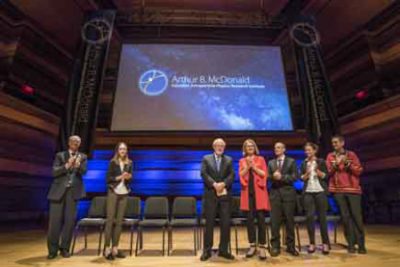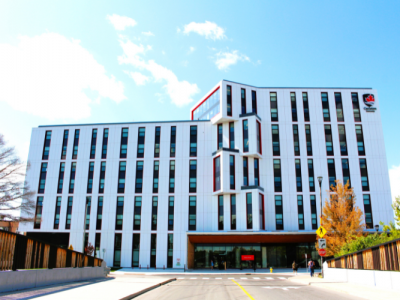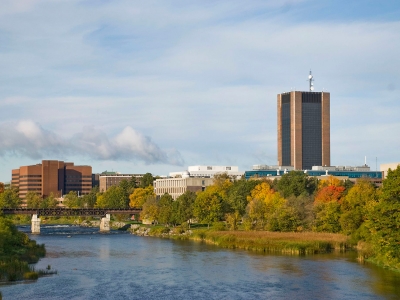By Ellen Tsaprailis
Photos by Chris Roussakis
 The collaborative institute that unifies Canada’s excellence in astroparticle physics research has officially been launched and named in honour of Nobel Laureate Arthur B. McDonald.
The collaborative institute that unifies Canada’s excellence in astroparticle physics research has officially been launched and named in honour of Nobel Laureate Arthur B. McDonald.
The new Arthur B. McDonald Canadian Astroparticle Physics Research Institute (or McDonald Institute) housed at Queen’s University was unveiled May 10 at a ceremony on the Kingston, Ont., campus.
Carleton’s Associate Vice-President (Strategic Initiatives and Operations), Sandra Crocker, was on hand to unveil the name of the institute that will advance scientific research and discovery in astroparticle physics.
“We are at the leading edge of new frontiers in particle physics and Carleton University is extremely proud to have been a partner in this journey for almost 30 years now,” said Crocker.
“Over the years, Carleton’s faculty members have made important contributions to the world of particle physics and have formed a well-respected physics faculty, not only in the field of particle physics, but in medical and theoretical physics as well.”
Arthur McDonald is professor emeritus at Queen’s and was co-winner of the Nobel Prize in Physics in 2015. He is an internationally celebrated researcher whose scientific contributions have advanced better understanding of the universe and set the path for new directions in the study of physics and astronomy.
McDonald, who attended the launch, was a close collaborator with Carleton’s David Sinclair and the SNOLAB project, which played a significant role in the discovery that neutrinos change identity and have mass. The Royal Swedish Academy of Sciences noted the discovery “has changed our understanding of the innermost workings of matter and can prove crucial to our view of the universe.”
Originally named the Canadian Particle Astrophysics Research Centre (CPARC), the centre was born as a result of a $63.7-million investment in 2016 from the federal Canada First Research Excellence Fund.
The McDonald Institute will facilitate a new level of astroparticle physics research through its collaboration with Carleton, Queen’s, SNOLAB, University of Alberta, University of British Columbia, Laurentian University, McGill University, University of Toronto, Université de Montréal, Canadian Institute for Advanced Research, Institute of Particle Physics, Perimeter Institute for Theoretical Physics and TRIUMF.
McDonald Institute Scientific Director Tony Noble has high expectations for the discoveries to come.
“This new institute will bring together unique experts from across Canada and leverages over $255 million of federal investment, with matching amounts from provincial partners, supporting astroparticle physics research over the last 20 years, including the leading experiments at the Sudbury Neutrino Observatory (SNO) and SNOLAB,” said Noble.
“Although the dimensions of the particles we are studying are minute, the implications of these discoveries are monumental and fundamental to the very properties of science and our understanding of the formation and evolution of the universe.”
Thursday, May 10, 2018 in News Releases
Share: Twitter, Facebook



